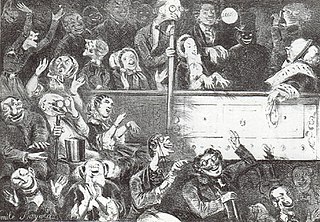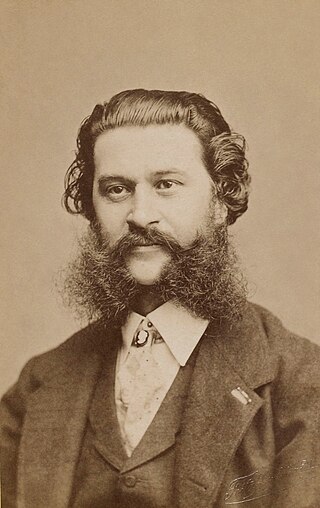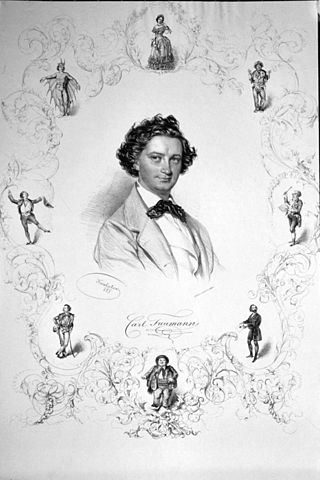
Operetta is a form of theatre and a genre of light opera. It includes spoken dialogue, songs, and dances. It is lighter than opera in terms of its music, orchestral size, length of the work, and at face value, subject matter. Apart from its shorter length, the operetta is usually of a light and amusing character. It sometimes also includes satirical commentaries.

Johann Baptist Strauss II, also known as Johann Strauss Jr., the Younger or the Son, was an Austrian composer of light music, particularly dance music and operettas as well as a violinist. He composed over 500 waltzes, polkas, quadrilles, and other types of dance music, as well as several operettas and a ballet. In his lifetime, he was known as "The Waltz King", and was largely responsible for the popularity of the waltz in Vienna during the 19th century. Some of Johann Strauss's most famous works include "The Blue Danube", "Kaiser-Walzer", "Tales from the Vienna Woods", "Frühlingsstimmen", and the "Tritsch-Tratsch-Polka". Among his operettas, Die Fledermaus and Der Zigeunerbaron are the best known.

Carl Michael Ziehrer was an Austrian composer. In his lifetime, he was one of the fiercest rivals of the Strauss family; most notably Johann Strauss II and Eduard Strauss.
Cagliostro-Walzer op.370 is a waltz by Johann Strauss II composed in 1875 based on themes from his operetta, Cagliostro in Wien which premiered on 27 February 1875 at the famous Theater an der Wien.
Vom Donaustrande is a polka by Johann Strauss II written in 1873. Its themes are drawn from his successful operetta, Der Karneval in Rom which premiered in Vienna's Theater an der Wien on 1 March 1873.

The Gypsy Baron is an operetta in three acts by Johann Strauss II which premiered at the Theater an der Wien on 24 October 1885. Its German libretto by Ignaz Schnitzer is based on the unpublished 1883 story Saffi by Mór Jókai. Jokai later published a novel A cigánybáró in 1885 using an expanded version of this same story.
Schatz-Walzer, Op. 418, is a Viennese waltz by Johann Strauss II composed in 1885. The melodies in this waltz were drawn from Strauss' operetta Der Zigeunerbaron, which premiered to critical acclaim on 24 October 1885. Der Zigeunerbaron, a Hungarian-influenced work, remained Strauss' best-remembered operetta after Die Fledermaus. The waltz version was first performed on 22 November that year in the concert hall of the Vienna Musikverein, with Eduard Strauss conducting.

The Great Waltz is a 1938 American biographical film based very loosely on the life of Johann Strauss II. It starred Luise Rainer, Fernand Gravet (Gravey), and Miliza Korjus. Rainer received top billing at the producer's insistence, but her role is comparatively minor as Strauss' wife, Poldi Vogelhuber. It was the only starring role for Korjus, who was a famous opera soprano and played one in the film.

Indigo und die vierzig Räuber is an operetta composed by Johann Strauss II to a German libretto by Maximilian Steiner based on the tale "Ali Baba and the Forty Thieves" from The Book of One Thousand and One Nights.

Franz Friedrich Richard Genée was a Prussian born Austrian librettist, playwright, and composer.

The Carltheater was a theatre in Vienna. It was in the suburbs in Leopoldstadt at Praterstraße 31.
Donauweibchen, Op. 427, is a waltz composed by Johann Strauss II in December 1887. The composition features melodies from Strauss' operetta Simplicius. It was first performed in January 1888 at one of Eduard Strauss's Sunday concerts in the Musikverein.
O schöner Mai!, Op. 375, is a waltz composed by Johann Strauss II. It features melodies from Strauss's fifth operetta, Prinz Methusalem. The waltz was first performed in January 1877, with Eduard Strauss conducting. The principal waltz theme of this work is a quote from the Act 3 duet for Pulcinella and Methusalem, while the remaining melodies are taken from Acts 1 and 2, including the Act 1 Chorus and Ensemble, "O schöner Mai!".
Banditen-Galopp is a galop composed by Johann Strauss II. It was arranged from melodies in Strauss' operetta Prinz Methusalem. The title of the composition is derived from the appearance in the stage work of a bandit gang intent on overthrowing the prince, and its main melody is in the Act 3 duet with chorus: "In der stille ganz verstohl'n werden wir Schätze hol'n." The finale of Act 1 provides the source of the galop's other tunes. The Banditen-Galopp was first performed in 1877.

Der Karneval in Rom —also known as Karneval in Rom— is an operetta in three acts composed by Johann Strauss II to a libretto by Josef Braun, Richard Genée and Maximilian Steiner. It was Strauss' second operetta and based on Victorien Sardou's 1861 comedy Piccolino. The work premiered on 1 March 1873 at the Theater an der Wien.
Indigo-Marsch, opus 349, is a march composed by Johann Strauss II. Its melodies are incorporated from Strauss' first operetta, Indigo und die vierzig Räuber. The work was first performed on 9 April 1871 at a concert in the Musikverein in Vienna, with Eduard Strauss conducting.
Carnevalsbilder, opus 357, is a waltz composed by Johann Strauss II. The waltz is based on melodies from Strauss' operetta Der Karneval in Rom. Strauss conducted its first performance in Vienna on July 9, 1873. Oscar Straus later arranged the second waltz theme of Carnevalsbilder for his operetta Drei Walzer as the soprano aria Ich liebe das Leben.
Waldine, Op. 385, is a polka-mazurka composed by Johann Strauss II. The title is taken from one of Strauss' operettas, Blindekuh. Waldine was the last, as well as the least successful, of the five orchestral dance compositions that Strauss had arranged on tunes from the operetta, having been first performed an entire year after the premiere of the operetta, where it was conducted by Eduard Strauss in the Musikverein in Vienna on December 7, 1879.

Der lustige Krieg is a three-act operetta composed by Johann Strauss II. The work was first performed on 25 November 1881 at the Theater an der Wien. Its libretto was by F. Zell and Richard Genée. The operetta was well received at its premiere, and was performed 69 times during its first run.

Matthias Karl Ludwig Treumann was an Austrian actor, operetta singer (tenor), theatre director and writer.








